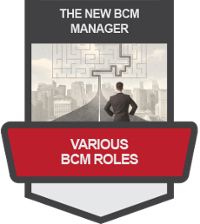Starting Your BCM Journey ...
Congratulations - you are either appointed to manage or already part of the team implementing and maintaining the Business Continuity Management (BCM) Program.
Be it full-time or part-time, it is good to have an understanding of the aspects of knowledge, skill set, and challenges that are needed to do a good job. So ask yourself, "What is My BCM Role?"
If you are looking for specific business continuity management (BCM) training courses with professional certification from BCM Institute, scroll down to the section "What Type of Training Can I Attend?"
 Let's start the discussion on your assigned BCM roles and responsibilities.
Let's start the discussion on your assigned BCM roles and responsibilities.
Can We Speak the Same Language?
One of the critical steps in the BCM journey is to “speak the same lingo.” Hence, an organization must define a “disaster” or "crisis" when embarking on business continuity management (BCM) and the many terms used during the implementation and management of this BCM program. In our context, aligning and correctly understanding each BCM terminology is critical.
What Is A Disaster or Crisis in the Business Continuity Management Context?
- What is Business Continuity Management?
- What Are the Key Terminology You Need to Know? Look for the terms in "BCMPedia: Business Continuity Management in Wikipedia"?
Where Do I Start?
If you are embarking on your BCM journey and is starting from a "blank page", what should be the steps that you should be
- Do you have an existing BCM framework and policy?
- Do you know who should be members of your BCM team?
How Do I Start?
 If you are truly a BCM newbie, you should start by gathering information from articles, case studies, and analyses of recent crises affecting organizations inside and outside your industry.
If you are truly a BCM newbie, you should start by gathering information from articles, case studies, and analyses of recent crises affecting organizations inside and outside your industry.
The key is to identify best-practice recommendations and any common pitfalls.
Read some related articles on our LinkedIn Page (Business Continuity Management).
What Type of Training Can I Attend?
At your home location, you can take related courses specific to business continuity management globally. If you find them useful, consider the BCM Institute's series of specialized BCM courses.
The quick question is, do I have the necessary skillset and know-how to do this job? What do I "not know"? How Do I Start My BCM Learning Journey?
 The institute offers the following training courses leading to professional certification.
The institute offers the following training courses leading to professional certification.
You may want to review the following BCM courses to determine their relevance to your roles and prior knowledge.
| "Manage" Competency | "Do" Competency | "Know" Competency |
 |
 |
 |
 |
 |
 |
 |
 |
 |
![Register [BL-B-3]*](https://no-cache.hubspot.com/cta/default/3893111/ac6cf073-4cdd-4541-91ed-889f731d5076.png) |
![Register [BL-B-4]](https://no-cache.hubspot.com/cta/default/3893111/dfe9674d-541a-4f83-ab07-cca408622958.png) |
 |
What is the Competency Needed to Manage a BCM Program?
For experienced and those seeking to progress in their careers, it is time to review and develop a learning road map that will accelerate their knowledge, skillset, and, most importantly, their careers.
and develop a learning road map that will accelerate their knowledge, skillset, and, most importantly, their careers.
Here are some of the related courses to consider.
Take stock by reviewing "What is My BCM Competency Level?" Click the icon to find out more.
You need to know where you are "Know-Do-Manage" and where you aspire to reach or are required by the current BCM role.
So, What Exactly Is Your BCM Role?
 For experienced professionals seeking to progress in their careers, it is time to review and develop a learning road map to accelerate their knowledge, skillset, and, most importantly, careers.
For experienced professionals seeking to progress in their careers, it is time to review and develop a learning road map to accelerate their knowledge, skillset, and, most importantly, careers.
However, if you are already the BCM Manager, what are the other roles within the BCM organisation? Find the respective roles in "Business Continuity Management: What is My Role."
Here are some of the four vital and related roles to be considered. Click the icon to read more.
What BCM Certification Can I Achieve?
Business Continuity Management Certification provides the necessary verification that you have the knowledge and experience required to implement or manage the crisis management program.
The three levels of certification are shown below. The types of crisis management certifications include BCCP, BCCS, and BCCE.
More information on the requirements to attain your certification can be found by clicking the BCM certification icon above.
Is There A Good Reference Guide?
![Why Read This Book [BCM] : A Manager's Guide to ISO 22301 Standard for BCM System](https://no-cache.hubspot.com/cta/default/3893111/0076e599-2a71-42d5-a3cd-679ea9c03319.png) The institute has published a specialized BCM book called "A Manager’s Guide to ISO22301 Standard for Business Continuity Management System." You can get a copy from the BCM Institute's store.
The institute has published a specialized BCM book called "A Manager’s Guide to ISO22301 Standard for Business Continuity Management System." You can get a copy from the BCM Institute's store.
This book will provide an overview of how a BCM framework is developed. The content advises the reader on implementing the ISO 22301:2019 framework, principles and methodologies.
Using the PDCA component as spelt out in the ISO Standard, this book provides a clear explanation of the standard and details on the “How-to” aspect of implementing your BCM program, plans and procedures. It also guides BCM professionals new to ISO to implement and achieve its Business Continuity Management System or BCMS. ISBN: 978-981-07-2512-9
How to Obtain Funding from the Singapore and Malaysia Government?

 Only Singaporeans and Singapore Permanent Residents (PR) can opt to attend BCM Institute's training with Skillsfuture Singapore Funding.
Only Singaporeans and Singapore Permanent Residents (PR) can opt to attend BCM Institute's training with Skillsfuture Singapore Funding.
 WSQ Courses: BCM Institute is an Authorized Training Centre (ATO), and the BCM training program is developed in collaboration with SkillsFuture Singapore (SSG).
WSQ Courses: BCM Institute is an Authorized Training Centre (ATO), and the BCM training program is developed in collaboration with SkillsFuture Singapore (SSG).
For Malaysians interested in attending the course, there is HRD Corp funding.









![Email to Sales Team [BCM Institute]](https://no-cache.hubspot.com/cta/default/3893111/3c53daeb-2836-4843-b0e0-645baee2ab9e.png)
